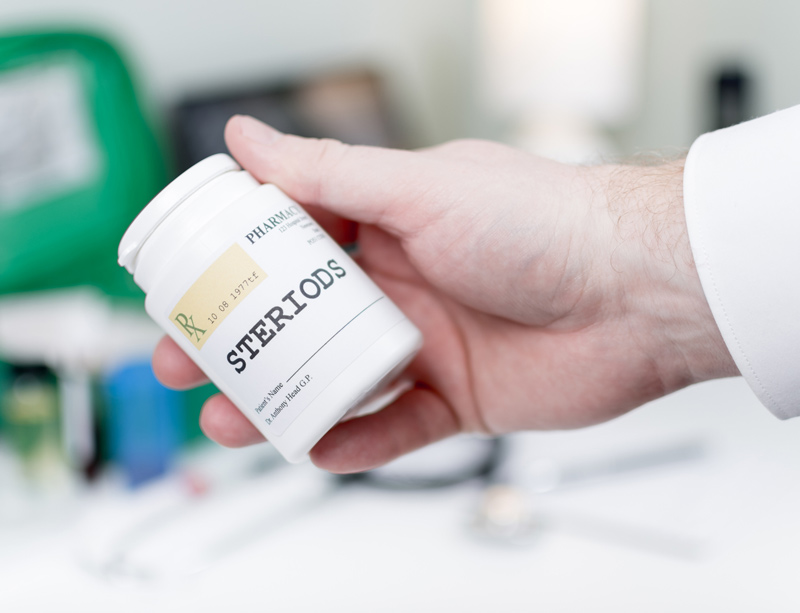Alimta-Related Skin Reactions with and Without Oral Steroids

Researchers from the University of New Mexico Comprehensive Cancer Center have published data suggesting oral steroids prior to chemotherapy — to reduce skin reactions — may not be necessary.
A chemotherapy regimen including Alimta (pemetrexed) is standard treatment for patients diagnosed with malignant pleural mesothelioma (MPM), but the drug is linked to serious skin reactions.
Oral steroids are prescribed to reduce this side effect.
But the UNMCCC retrospective study, published October 14 in the Journal of Oncology Pharmacy Practice, raises questions about whether oral steroids are a necessary part of Alimta treatment for MPM.
The research also highlights the possibility of replacing oral steroids with one IV dose at each chemotherapy infusion.
“Three days of oral dexamethasone 4 mg twice daily did not significantly affect the incidence rates of cutaneous reactions, delay in therapy, or change in therapy in patients who received intravenous dexamethasone before pemetrexed infusion at UNMCCC,” the authors wrote.
A cutaneous reaction is any undesirable change in the structure or function of the skin, appendages or mucus membranes. They are a common side effect associated with Alimta.
Oral Steroids to Prevent Alimta Skin Reactions
Eli Lilly, the manufacturer of Alimta, recommends patients take 4 mg of oral dexamethasone twice daily for three consecutive days, beginning the day before each infusion of the drug.
For this reason, the standard-of-care chemotherapy regimen for mesothelioma — which involves Alimta — has traditionally included oral steroids.
Chemotherapy-related skin reactions can be itchy, painful and severe. In rare cases, they can be life-threatening.
Oncologists prescribe oral steroids to reduce the likelihood of Alimta-related skin reactions, but steroids are not without their own risks.
According to the U.S. National Library of Medicine, the steroid medication dexamethasone can cause numerous side effects including:
-
Irritability
-
Difficulty sleeping
-
Swelling in the ankles and feet
-
Heartburn
-
Muscle weakness
-
Impaired wound healing
-
Increased blood sugar levels
-
Mood swings, dizziness and headaches
When oncologists prescribe oral steroids, they weigh these risks against the benefit of preventing potentially life-threatening skin reactions.
They also may consider what form of the medication is most likely to provide benefit while minimizing the risk of side effects associated with steroids.
The data from the UNMCCC provides new information oncologists can consider when weighing the risks and benefits of oral steroids for pleural mesothelioma patients receiving Alimta.
The study also raises the issue of nonadherence to the oral steroid prescription and the possibility that a one-time IV steroid dose with each chemotherapy infusion may be a better option.
No Significant Difference Between Cohorts
The researchers identified 85 patients who received at least one dose of Alimta between 2012 and 2017.
This group included patients with non-small cell lung cancer and MPM. Two patients had bladder cancer.
Using medical records, the study authors identified 29 patients who did not receive three days of oral steroids as recommended by the makers of Alimta. Fifty-six patients did receive dexamethasone.
There were no significant differences between the patients who took oral steroids and those who did not in terms of skin reactions, delays in Alimta treatment or changes in therapy because of other adverse events.
“The only statistically significant difference between groups was the incidence of neutropenia, which was higher in the intervention group,” the authors wrote.
Neutropenia is the medical term for decreased immunity.
Steroids Still an Important Part of Alimta Treatment
The UNMCCC study highlights an important aspect of how IV steroids are used for patients scheduled to receive Alimta chemotherapy at the facility.
The facility routinely administers 10 mg of dexamethasone through an IV to patients who are scheduled to receive Alimta. This is given just before chemotherapy treatment begins.
“This study supports the use of intravenous dexamethasone 10 mg before pemetrexed infusion in place of three days of oral dexamethasone 4 mg twice daily at UNMCCC,” the authors wrote.